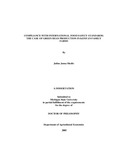| dc.description.abstract | The food safety scandals of the 1990s have led developed country governments and
retailers to enact strict international food safety standards (IFSS) covering four broad
areas: pesticide residue limits, worker safety, packer hygiene, and traceability. This
study investigates the impact of these standards on green bean farmers in Kenya.
The first essay uses econometric analysis to examine whether transitioning to
safer pesticides affects farmers’ health costs of pesticide exposure, incidence of acute
pesticide-induced illnesses, and use of protective gear. It finds that enforcing and
monitoring developed country pesticide standards reduces the health costs of
pesticide-related illnesses and also increases the use of protective gear. The essay
concludes that there are health benefits to Kenyan farmers beyond the acknowledged
income generation from selling to the premium developed country market.
The second essay uses survey data and econometric analysis to investigate the
effect of wealth on green bean farmers’ ability to obtain a contract with an exporter
firm and the degree of subsequent compliance with IFSS. It finds that endowments
vii
with physical capital, human capital, and social capital affect both the likelihood of a
green bean farmer obtaining a marketing contract from an exporter firm and the
subsequent degree of compliance with IFSS. While this finding implies that IFSS
marginalize smallholders, related evidence indicates that developing country
smallholders can avoid being marginalized by banding together and collectively
investing in costly fixed assets.
The third essay uses case study techniques to analyze how small and large
Kenyan green bean family farms are complying with IFSS. It finds that IFSS increase
the transaction costs of producing beans and make quality verification problematic.
As a result, both types of farmers use contracts to safeguard their specific
investments. Buyers, on the other hand, tackle the information asymmetry of
enforcing compliance with hard-to-observe IFSS requirements using closely
monitored contracts, the threat of contract termination, and variable product pricing.
Buyers have also required smallholders to band together into marketing groups in
order to reduce monitoring costs. The essay concludes that the future of smallholders
lies in banding together into cooperative groups that collectively invest in fixed and
specific assets thereby attaining the scale economies needed to remain viable.
This study demonstrates that IFSS can reduce farmers’ pesticide-induced
morbidity. It also demonstrates that while the fixed investments needed to comply
with IFSS present a major barrier to poor smallholders, such farmers can overcome
this hurdle by banding together and meeting the costs of fixed investments as a group. | en |

